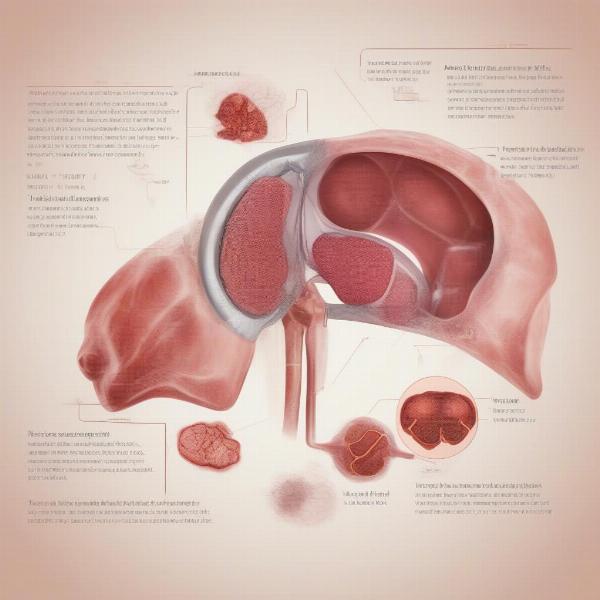Detox for dogs is a topic that often sparks interest and raises questions among pet owners. While the concept of “detoxing” can be complex, understanding how to support your dog’s natural detoxification processes can contribute to their overall health and well-being. This comprehensive guide will explore various aspects of canine detoxification, including what it entails, when it might be necessary, and safe and effective methods to support your furry friend’s health.
Understanding Detoxification in Dogs
Just like humans, dogs have built-in detoxification systems primarily handled by the liver and kidneys. These organs work tirelessly to filter out toxins and waste products from the bloodstream, keeping your dog healthy. However, various factors, including environmental pollutants, processed foods, and certain medications, can put extra strain on these vital organs. Supporting your dog’s natural detox pathways can help them function optimally.
 Dog Liver and Kidney Detox
Dog Liver and Kidney Detox
Signs Your Dog Might Benefit from Detox Support
While not always obvious, certain signs might indicate your dog could benefit from some extra support for their detoxification processes. These signs can include:
- Dull coat
- Skin issues
- Lethargy
- Digestive problems
- Bad breath
If you notice any of these symptoms, it’s crucial to consult with your veterinarian to rule out any underlying medical conditions. They can help determine the cause and recommend appropriate actions.
Safe and Effective Detox Methods for Dogs
Several safe and effective ways to support your dog’s detox processes exist. These include:
- Dietary Adjustments: Feeding a balanced, species-appropriate diet rich in whole foods is the cornerstone of any detox program. Consider incorporating fresh fruits and vegetables, like blueberries and carrots, known for their antioxidant properties.
- Hydration: Ensuring your dog has access to fresh, clean water is crucial for flushing out toxins.
- Supplements: Certain supplements, such as samylin for dogs, can support liver function. Always consult your vet before adding any supplements to your dog’s diet.
- Exercise: Regular physical activity helps stimulate circulation and lymphatic drainage, supporting the elimination of waste products.
- Environmental Control: Minimizing exposure to toxins in the environment, such as pesticides and cleaning chemicals, can reduce the burden on your dog’s detox system.
What to Avoid When Detoxing Your Dog
Certain practices should be avoided when supporting your dog’s detox processes, as they can be harmful. These include:
- Extreme fasting or restrictive diets: These can deprive your dog of essential nutrients and negatively impact their health.
- Unproven detox products: Many products marketed for detoxing dogs lack scientific evidence and may contain harmful ingredients.
- DIY detox recipes: Unless guided by a holistic veterinarian, attempting homemade detox remedies can be risky and potentially dangerous.
When to Consult a Veterinarian
It’s essential to consult your veterinarian before implementing any detox program for your dog, especially if they’re exhibiting symptoms of illness. Your vet can assess your dog’s individual needs and recommend the safest and most effective approach.
Conclusion
Detox for dogs is about supporting their natural detoxification pathways to maintain optimal health. By focusing on a balanced diet, hydration, exercise, and a clean environment, you can help your furry friend thrive. Always consult with your veterinarian before making any significant changes to your dog’s diet or lifestyle, especially if they’re experiencing health issues. They can guide you on the best course of action to ensure your dog’s safety and well-being.
FAQ
- What are the signs of toxicity in dogs? Signs can vary depending on the toxin but can include vomiting, diarrhea, lethargy, tremors, and seizures.
- Can I detox my dog at home? While some supportive measures can be taken at home, always consult your veterinarian before implementing any detox program.
- How long does it take to detox a dog? The duration depends on several factors, including the type and level of toxins involved and the dog’s individual health.
- Are there specific foods that can help detoxify a dog? Foods rich in antioxidants, like blueberries and carrots, can support detoxification.
- What are the risks of detoxing a dog? Improperly implemented detox programs can lead to nutritional deficiencies and other health problems. Always consult with your veterinarian.
- How often should I detox my dog? Regularly supporting your dog’s natural detoxification pathways through a healthy lifestyle is more beneficial than periodic “detox” programs.
- Are there any specific breeds more prone to needing detox support? Not necessarily, but individual sensitivities can vary.
ILM Dog is a leading online resource dedicated to providing dog owners worldwide with expert advice and practical information on all aspects of canine care. From breed selection and health to training, nutrition, and grooming, we offer a wealth of knowledge to help you provide the best possible care for your beloved companion. Whether you’re a seasoned dog owner or just starting your journey, ILM Dog is here to support you every step of the way. For expert advice and personalized support, contact us at [email protected] or call +44 20-3965-8624. Visit ILM Dog today for more valuable insights and resources!